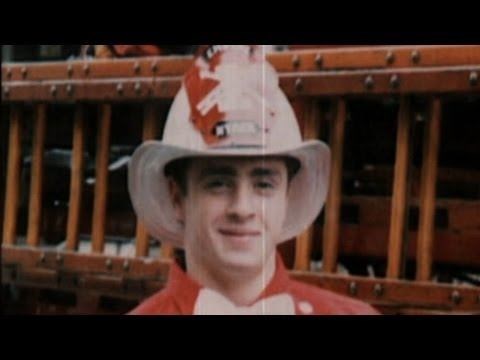 |
| (https://www.youtube.com/watch?v=jwBcKI8YLLs ()) |
"If he hadn't come back, I wouldn't have made it. People can live 100 years and not have the compassion, the wherewithal to do what he did"(Judy Wein). Judy Wein was one of the few survivors that came out of the World Trade Center safe and sound on 9/11. She was found with a broken arm, cracked ribs and a punctured lung, then mysteriously carried down 17 floors by a helpful stranger wearing a red bandana over his mouth. Welles Crowther, otherwise known as the "Man in the Red Bandana", was born on May 17, 1977 and he died on September 11th, 2001. At age 6, his father gave him a bandana just like his own in the color, but instead of blue like his own, he gave Welles one in the color cherry red. Welles wore this every single day- under his helmet at every game, in his pocket, it could always be found his person. Little did he know, this simple bandana that he carried around with him each day would become his trademark, and what made him recognizable as the hero that saved dozens of people from a burning building. One of the traits that comes along with being a hero is selflessness, or the action of putting others before yourself. Another one of the traits a hero must possess, is the willingness to sacrifice themselves for others, just as Welles did. One last trait that makes a hero stand out, is courage during the toughest times. Welles Crowther was more than an equities trader working on the 104th floor of the World Trade Center. He was a hero and an inspiration due to his prevalent trait of humanity, his willingness to sacrifice himself for others, and his strong sense of courage even during tough times.
One of the reasons that Welles is such an inspiring person is due to his humanity that he showed towards others in everything that he did. In an interview with Welles' mother, Alison, she said this about her son's character: "The best trait Welles possessed was humanity. It encompasses so many aspiring and enviable traits, and every word used to define humanity could easily be used on him -- compassion, brotherly love, kindness, fraternity, tolerance"(Mink). When Welles' mom said this, it justified everyone's feelings and thoughts about him and who he was. It showed one of the many reasons that he was and still is so inspiring, and why he did what he did. If he didn't have humanity, and so much compassion for others, he wouldn't have saved so many lives that day. Fox News published an article honoring Welles back in 2002, and here is the very first line of the article: "In high school, he was the type of kid who would selflessly feed the puck to the hockey team's lowest-scoring player, hoping to give his teammate his first goal"(Fox News). This shows how he always thought of others for himself, and a brotherly, sincere love for each person he met. Even back in high school, he was always focused on helping others, and making sure that everyone was happy even if it would cost him a few goals and glory. Welles possessed a great amount of humanity, a trait that many people appreciate, and wish to obtain. He showed nothing but love, compassion, and kindness to each person he met. This trait that he possessed changed lives.
 |
| (http://www.911memorial.org/blog/remembering-%E2%80 ()) |
Welles possessed so many traits that made him such an inspiring person. One of those traits was his willingness to sacrifice himself for others. One of the reasons that Welles is seen as a hero in the eyes of the American public is due to his selfless efforts of saving others from the fiery furnace that became the World Trade Center on September 11th, 2001. "'Welles could have evacuated as a civilian, but that was the moment he left his civilian life behind and he made the choice to become a first responder,' Cliff Chanin of the National September 11 Memorial & Museum told IBD"(Mink). As soon as Welles heard the news, instead of hurrying to get himself out of the building he immediately set out to go help other people. He could've just gotten himself out of harm's way, but instead he thought of the other helpless people in the other building. After Welles rushed out of his office to become a "first responder" (Mink), he hurried to go help other people for example, "He carried a woman on his back, down seventeen floors. Then he ran back up and talked the way he talked on the ice, on the lacrosse field, willing people to get up and help others if they could. They did what he said, and they made it out. Welles didn't " (Cullen). Sadly, all though Welles saved at least a dozen lives that day, he could not save his own. Even though he could've easily gotten out of the building several times, he kept going back up into the fiery furnace of the 78th floors and above, and saved as many souls as he could even if it meant that would be the last thing he would do. If Welles hadn't sacrificed himself and saved others, instead of focusing purely on his own safety, he probably would've come out alive. But, at least a dozen other people would've died in his place. His sacrifice saved lives.
There is one more thing that truly stands out about Welles' character. He had so much courage even during the toughest times and that is what makes him a hero. For example, "When United Flight 175 sliced through the South Tower on September 11th, 2001, Welles ran out of his office and became, for all intents and purposes, an FDNY firefighter. He ran downstairs and began helping people on the floors below"(Cullen). When Welles heard the news, he went back to his firefighter training from just a few years back, and put it to use to help others stay calm and get out. It must've been very hard for him to keep other people to stay calm in this situation, let alone himself. Instead of running away from the plane crash and calling for help that would maybe never come, "He looked the devil straight in the eye that day and fought with all the strength and fiber of his being," Alison Crowther said. "He died saving others" (Lerner). When the planes struck, when faced with trauma, death, and terror, he had the courage to grab the bull by the horns and stick it out. On the inside, even if he was in fact scared, (which he probably was) he didn't let that stop him from making sure that he saved every life that he could that day. It must have taken an incredible amount of courage to do what he did. He would not have been capable of doing what he did, running through a burning, crashing building, without courage. If he hadn't had such a great amount of courage, he never could've saved so many lives.
In the end, Welles Crowther is truly an inspiration to all, through his humanity, constant sacrifice for others, and his amazing amount of courage during tough times. He saved at least a dozen lives from the plane crashing into the twin towers on 9/11. Not only that day, but his whole life he was always looking out for others and doing the right thing. That day, when impacted, changed, and saved so many lives, he didn't manage to save his own. Welles is such an inspiration to me because when I picture myself in that situation, the first thing that would pop into my head would probably not be to make sure everyone else got out of the building before myself. He had so many admirable qualities that surely almost everyone wishes to possess, such as compassion, love for everyone, courage, selflessness, and humanity. All in all, Welles Crowther is a true American hero. He completely sacrificed himself for so many others, and I'm sure that if he had the choice to do it all again, he would. After learning of all of the things that he has done for the good of all people, and all of his admirable traits, the "Man in the Red Bandanna" will always be my hero.
Works Cited
Botelho, Greg, and Maria Hinojosa. "America Remembers." CNN. Cable News Network, n.d. Web. 10 Feb. 2016.
Cullen, Kevin. "Welles Crowther's Legacy Lives on - The Boston Globe." BostonGlobe.com. The Boston Globe, 09 Sept. 20141. Web. 02 Feb. 2016.
Lerner, Jane. "Welles Crowther: The Man behind the Red Bandanna."Lohud - The Journal News. USA Today, 15 May 2014. Web. 3 Feb. 2016.
"'Man in the Red Bandanna' Died Saving Others | Fox News." Fox News. FOX News Network, 10 Sept. 2002. Web. 02 Feb. 2016.
Mink, Michael. "A Hero In The 9/11 Inferno Soar: Welles Crowther sacrificed his life to rescue others."Investor's Business Daily 11 Sept. 2013: A3. Student Resources in Context. Web. 29 Jan. 2016.
Page created on 2/15/2016 12:00:00 AM
Last edited 2/15/2016 12:00:00 AM
